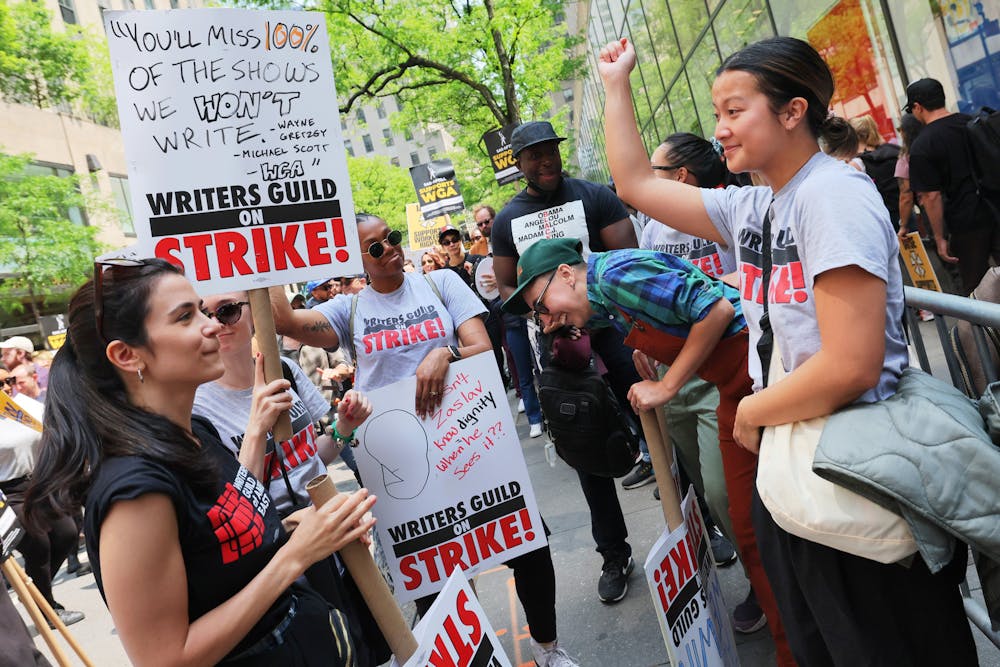On May 2, The Writers Guild of America voted to authorize a strike following six weeks of failed negotiations with Alliance of Motion Picture and Television Producers. The WGA, which is made up of two labor unions that represent over 10,000 writers across film, television, radio and online media, demand higher pay, a structure for writers to earn streaming residuals and a regulation against the use of artificial intelligence in writing or rewriting scripts.
The WGA previously went on strike for three months in 2007, costing studios an estimated $2 billion according to an article by Calmatters. While writers were able to negotiate a deal to receive 2% of gross revenue on streaming services for their work and 1.2% of distributors revenue made off digital rentals and purchases, it was years before streaming giants such as Netflix, Amazon or Hulu started producing series and films of their own.
With network television, writers receive payment for each episode they write as well as reuse payments, known as residuals, received each time the episode is aired. Network syndication also allows for programs to be sold to local or foreign stations once they crossed the 100-episode mark, providing writers a reliable source of income for their work proportional to how successful that work is.
As streaming services have risen in popularity and started producing a number of successful programs over the past decade, many writers receive residuals at a rate significantly lower than they would in the past. This has its effects even for network TV shows, whose audience include the many viewers who wait for a show to be available on a streaming service.
“Good thing I, as the writer of this episode, do not benefit from this success because of the current streaming residuals model,” said Brittani Nichols in a tweet along with a screenshot of a Deadline article stating that the season two finale of “Abbott Elementary” received 7 million viewers one week after airing on ABC and releasing on Hulu.
It’s even worse for series that exist only on streaming services, where there are fewer seasons, fewer episodes and annual residual payments at a fixed rate. “The Bear” writer Alex O’ Keefe revealed to The New Yorker that he had to attend the WGA awards ceremony in March with a negative bank account, despite the series bringing in some of the most impressive viewership numbers in FX and Hulu history.
In a series of tweets, O’ Keefe wrote “98% of staff writers work for the minimum. We don't receive residuals based on the success of our streaming shows. We don't have a way to stay afloat between gigs and every gig feels like a miracle.”
In response to social and political issues over the past decade, executives have made more of an effort to green light diverse shows led by creators of color. However, their efforts cannot be seen as being supportive of diverse stories when they fail to fairly pay those whose work they are profiting from and ignoring their demands.
Along with the WGA strike, the Screen Actors Guild announced they will hold a strike authorization vote ahead of June 7 negotiations.
“We must get all our ducks in a row should the need present itself,” said SAG-AFTRA President Fran Drescher in a press release. “The prospect of a strike is not a first option, but a last resort.”
If SAG-AFTRA was to join the WGA on strike, it would deem ABC and NBC’s Fall TV schedules less ‘strike-proof’ than planned, shut down production on virtually all scripted film and TV and apply even more pressure to studio executives who need writers and actors if they want to keep making profits.
As for what comes next, that is all up to the studios who have the power to end the strike by listening to their employees. Or they can continue to spend time unveiling the third rebrand for their streaming service in a decade, green lighting unscripted content that people have little interest in, and eventually run out of movies to release in theaters.






